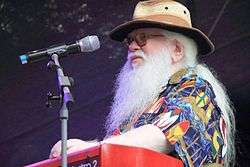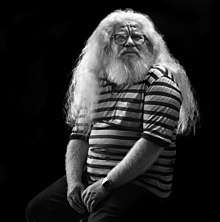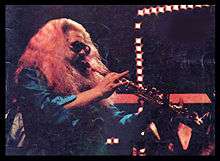Hermeto Pascoal
Hermeto Pascoal (born June 22, 1936) is a Brazilian composer and multi-instrumentalist. He was born in Lagoa da Canoa, Alagoas, Brazil.[1] Pascoal is a legendary figure in the history of Brazilian music, mainly known for his abilities in orchestration and improvisation, as well as being a record producer and contributor to many Brazilian and international albums.[2]
Hermeto Pascoal | |
|---|---|
 Rudolstadt-Festival, 2016 | |
| Background information | |
| Born | June 22, 1936 Lagoa da Canoa, Alagoas, Brazil |
| Genres | Brazilian music, avant-garde jazz, forró |
| Occupation(s) | Musician, composer |
| Instruments |
|
| Years active | 1950s–present |
| Website | Official website |
Biography
Early life and career


Pascoal comes from northeastern Brazil, an area that lacked electricity at the time he was born. He learned the accordion from his father and practised for hours indoors as, being albino, he was incapable of working in the fields with the rest of his family.[2]
Hermeto's career began in 1964 with appearances on several Brazilian recordings alongside relatively unknown groups. These now-classic albums and the musicians involved (Edu Lobo, Elis Regina, Cesar Camargo Mariano) established widely influential new directions in post-bossa nova Brazilian jazz.
In 1966, he played in the Sambrasa Trio, with Airto Moreira and Humberto Clayber; they released only one album, Em Som Maior. Then he joined Trio Novo (Airto Moreira, Heraldo do Monte, Theo de Barros) and in 1967 the group, renamed Quarteto Novo, released an album that launched the careers of Pascoal and Moreira.[3] Pascoal would then go on to join the multi-faceted group Brazilian Octopus.
International fame

Pascoal initially caught the international public's attention with an appearance on Miles Davis's 1971 album Live-Evil, which featured him on three pieces, which he also composed.[2] Davis allegedly called Pascoal "the most impressive musician in the world".[4] Later collaborations involved fellow Brazilian musicians Airto Moreira and Flora Purim. From the late 1970s onward he has mostly led his own groups, playing at many prestigious venues, such as the Montreux Jazz Festival in 1979. Other members of the group have included bassist Itibere Zwarg, pianist Jovino Santos-Neto and percussionists Nene, Pernambuco and Zabele.
Known as o Bruxo (the Sorcerer), Pascoal often makes music with unconventional objects such as teapots, children's toys, and animals, as well as keyboards, button accordion, melodica, saxophone, guitar, flute, voice, various brass and folkloric instruments.[2] Perhaps because he grew up in the countryside, he uses nature as a basis for his compositions, as in his Música da Lagoa, in which the musicians burble water and play flutes while immersed in a lagoon: a Brazilian television broadcast from 1999 showed him soloing at one point by singing into a cup with his mouth partially submerged in water. Folk music from rural Brazil is another important influence in his work.[2]
Between 1996 and 1997, Pascoal worked on a book project called Calendário do Som, which contains a song for every day of the year, including 29 February, so that everyone would have a song for their birthday.[2]
Hermeto was married to Ilza da Silva, to whom he dedicated many compositions, from 1954 until her death in 2000. They had six children, Jorge, Fábio, Flávia, Fátima, Fabiula and Flávio, and many grandchildren. He was married to Aline Morena from 2003 until 2016, while living in Curitiba, Paraná, Brazil.[5][6][7] He has since returned to the Jabour neighborhood in Bangu, Rio de Janeiro, where he spent much of his time living, composing, rehearsing and hosting musicians from all over the world.[7]
Discography
As leader or member
- 1961: Conjunto Som 4 (with Conjunto Som 4)
- 1966: Em Som Maior (with Sambrasa Trio)
- 1967: Quarteto Novo (with Quarteto Novo)
- 1969: Brazilian Octopus (with Brazilian Octopus)
- 1970: Hermeto Pascoal (solo debut, reissued on CD as Brazilian Adventure)(featuring Googie Coppola)
- 1973: A música livre de Hermeto Pascoal
- 1976: Slaves Mass
- 1977: Trindade
- 1979: Zabumbê-bum-á
- 1979: Ao vivo Montreux Jazz Festival
- 1979: Nova história da Música Popular Brasileira (compilation)
- 1980: Cérebro magnético
- 1982: Hermeto Pascoal & Grupo (reissued by Westwind Germany on CD as The Legendary Improviser. The reissue appears to be a copy from vinyl.)
- 1984: Lagoa da Canoa, Município de Arapiraca
- 1986: Brasil Universo
- 1987: Só não toca quem não quer
- 1988: Hermeto solo: por diferentes caminhos
- 1992: Festa dos deuses
- 1993: Instrumental no CCBB (with Renato Borghetti)
- 1998: Música!: o melhor da música de Hermeto Pascoal (compilation)
- 1999: Eu e eles
- 2002: Mundo verde esperança
- 2006: Chimarrão com rapadura (with Aline Morena)
- 2010: Bodas de Latão (with Aline Morena)
- 2013: Hermeto Pascoal: The Monash Sessions
- 2017: No Mundo dos Sons
- 2017: Viajando com o som (recorded in 1976)
- 2017: Natureza Universal
As contributor
- 1956: Ritmos Alucinantes, by Clovis Pereira
- 1959: Batucando no Morro, by Pernambuco do Pandeiro e seu regional
- 1970: Natural Feelings, by Airto Moreira
- 1970: Electric Byrd, by Donald Byrd
- 1970: Sergio Mendes Presents Lobo, by Edu Lobo
- 1970: It Could Only Happen with You, by Duke Pearson
- 1970: Live-Evil, by Miles Davis
- 1971: Cantiga de Longe, by Edu Lobo
- 1971: Seeds on the Ground, by Airto Moreira
- 1975: Di Melo, by Di Melo
- 1976: Imyra, Tayra, Ipy, by Taiguara
- 1976: Open Your Eyes, You Can Fly, by Flora Purim
- 1976 Goldenwings, by Opa
- 1977: Orós, by Raimundo Fagner
- 1978: Robertinho no passo, by Robertinho de Recife
- 1979: Sivuca, by Sivuca
- 1979: Live in Montreux, by Elis Regina
- 1980: Stone Alliance, by Márcio Montarroyos
- 1983: Cordas vivas, by Heraldo do Monte
- 1984: Ponto do músicos, by Nenê
- 1986: Balãozinho, by Eduardo Gudin
- 1986: Cordas mágicas, by Heraldo do Monte
- 1986: Pindorama, by Pau Brasil
- 1987: Flávio Pantoja, by Flavio Pantoja
- 1987: Dharana, by Dharana
- 1996: Brasil Musical - Série Música Viva - Pau Brasil E Hermeto Pascoal|Brasil Musical - Série Música Viva (with Pau Brasil)
- 1998: Maritmo, by Adriana Calcanhotto (on track "Canção por Acaso")
- 2000: Oferenda, by Aleuda
- 2000: Nação Nordestina, by Zé Ramalho (on track "Violando com Hermeto")
- 2003: Serenata: The Music of Hermeto Pascoal, by Mike Marshall and Jovino Santos Neto
- 2006: Roda Carioca, by Jovino Santos Neto
References
- "Hermeto Pascoal Discography - Slipcue.com Brazilian Music Guide".
- Neder, Alvaro. "Hermeto Pascoal". AllMusic. Retrieved 2011-10-22.
- "N. Scott Robinson-World Music and Percussion, Frame Drums, Riq, Tambourines". Nscottrobinson.com. Retrieved 2011-10-22.
- Tamarkin, Jeff (2018). "Hermeto Pascoal & Grupo Vice Versa: Viajando Com O Som (The Lost '76 Vice-Versa Studio Session) (Far Out)". JazzTimes. Retrieved 26 April 2020.
- "Aos 77 anos, músico cult Hermeto Pascoal agora quer ser pop - 23/02/2014 - Serafina - Folha de S.Paulo". Folha de S.Paulo (in Portuguese). Retrieved 2016-01-10.
- "Aline e Hermeto - namoro musical em Santa Felicidade". Gazeta do Povo (in Portuguese). Retrieved 2017-01-08.
- "Aos 80, multi-instrumentista Hermeto Pascoal ainda se sente uma criança". Folha de S.Paulo (in Portuguese). Retrieved 2017-01-08.
| Wikimedia Commons has media related to Hermeto Pascoal. |